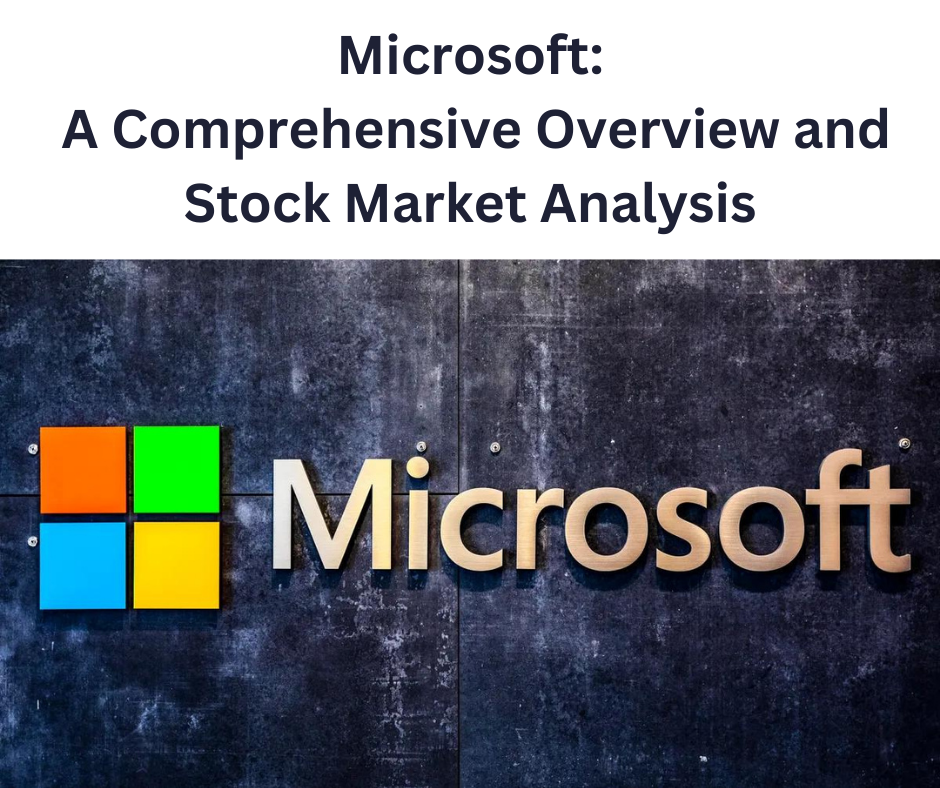Microsoft: A Comprehensive Overview and Stock Market Analysis
Introduction
Microsoft Corporation, founded by Bill Gates and Paul Allen in 1975, has grown into one of the most influential technology companies in the world. Known for its software products, hardware devices, and cloud services, Microsoft has continually adapted to the ever-evolving tech landscape. This blog provides a comprehensive overview of Microsoft, its key products and services, and an analysis of its stock market performance.
Company Overview
Key Products and Services
Microsoft’s product portfolio is vast, but some of its key offerings include:
| Product/Service | Description |
|---|---|
| Windows OS | The most widely used operating system for personal computers. |
| Microsoft Office | A productivity suite including Word, Excel, PowerPoint, and Outlook. |
| Azure | A cloud computing platform offering a range of services, including AI and databases. |
| A professional networking site acquired in 2016. | |
| Surface Devices | A line of personal computing devices including laptops and tablets. |
| Xbox | A gaming console and services establishing Microsoft in the gaming industry. |
Strategic Acquisitions
Microsoft has made several strategic acquisitions to enhance its product offerings and expand its market reach. Notable acquisitions include LinkedIn, GitHub, and more recently, Nuance Communications. These acquisitions have bolstered Microsoft’s capabilities in areas such as professional networking, software development, and artificial intelligence.
Financial Performance
Revenue and Profit Growth
Microsoft has consistently demonstrated strong financial performance. In the fiscal year 2023, Microsoft reported revenue of $211.9 billion, reflecting a year-over-year growth of 17%. The company’s net income for the same period was $72.5 billion, an increase of 21% from the previous year. This robust growth is primarily driven by the success of its cloud services and the continued dominance of its software products.
| Financial Metric | Fiscal Year 2023 |
|---|---|
| Revenue | $211.9 billion |
| Net Income | $72.5 billion |
| Year-over-Year Growth | 17% (Revenue), 21% (Net Income) |
Stock Market Performance
Microsoft’s stock (MSFT) is a prominent component of major indices such as the S&P 500 and NASDAQ-100. Over the past decade, MSFT has shown remarkable appreciation, providing substantial returns to its shareholders. As of August 2024, Microsoft’s market capitalization stands at approximately $2.5 trillion, making it one of the most valuable companies globally.
Dividend Policy
Microsoft is known for its shareholder-friendly policies, including a consistent dividend payout. The company has a track record of increasing its dividend annually, reflecting its commitment to returning value to its shareholders. As of the latest fiscal year, Microsoft’s dividend yield stands at around 0.8%.
Competitive Landscape
Key Competitors
Microsoft operates in a highly competitive environment. Some of its primary competitors include:
- Apple Inc.: Competes with Microsoft in personal computing and software.
- Alphabet Inc. (Google): A major competitor in cloud computing, productivity software, and online services.
- Amazon Web Services (AWS): The leading competitor in the cloud services market.
- Salesforce: Competes with Microsoft in the customer relationship management (CRM) software market.
Competitive Advantages
Microsoft’s competitive advantages include its strong brand recognition, extensive product ecosystem, and significant research and development (R&D) investments. The company’s ability to integrate its various products and services creates a seamless user experience, fostering customer loyalty and reducing churn.
Stock Market Analysis
Valuation Metrics
To analyze Microsoft’s stock, several key valuation metrics can be considered:
| Valuation Metric | Value (as of August 2024) |
|---|---|
| P/E Ratio | 35 |
| P/S Ratio | 12 |
| EPS | $9.05 |
Growth Prospects
Microsoft’s growth prospects remain robust, driven by several factors:
- Cloud Services: The global shift towards cloud computing presents significant growth opportunities for Azure. Microsoft’s cloud revenue is expected to grow at a compound annual growth rate (CAGR) of 20% over the next five years.
- Artificial Intelligence (AI): Investments in AI technologies and acquisitions like Nuance Communications position Microsoft well in the burgeoning AI market.
- Gaming: The gaming division, including Xbox and related services, continues to be a significant growth driver, capitalizing on the expanding gaming industry.
Risks and Challenges
While Microsoft’s outlook is positive, there are several risks and challenges to consider:
- Regulatory Scrutiny: As a tech giant, Microsoft faces increasing regulatory scrutiny globally, which could impact its operations and growth.
- Intense Competition: The tech industry is highly competitive, and maintaining market leadership requires continuous innovation and investment.
- Macroeconomic Factors: Economic downturns, fluctuations in currency exchange rates, and geopolitical tensions can adversely affect Microsoft’s financial performance.
Conclusion
Microsoft’s journey from a small software company to a global tech leader is a testament to its innovation, strategic vision, and execution. With a diverse product portfolio, strong financial performance, and promising growth prospects, Microsoft remains a solid investment in the tech sector. However, investors should stay informed about the competitive landscape and potential risks to make well-informed decisions. As the company continues to evolve, its ability to adapt and innovate will be crucial in maintaining its market position and delivering value to its shareholders.
By focusing on emerging technologies, expanding its cloud services, and leveraging strategic acquisitions, Microsoft is well-positioned to capitalize on future growth opportunities, making it a compelling choice for investors looking for long-term value in the technology sector.
Disclaimer
This blog is for informational purposes only and does not constitute financial advice. The views expressed herein are those of the author and do not necessarily reflect the views of any affiliated entities. Investing in the stock market involves risks, and you should conduct your own research or consult with a financial advisor before making any investment decisions.







